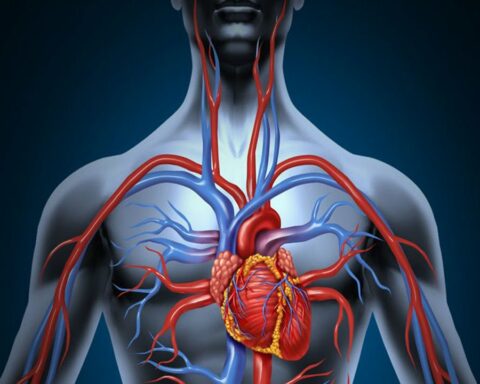Symptoms of iodine deficiency include neck swelling, weight gain, fatigue, hair loss, skin dryness, difficulty remembering, a problem during pregnancy, heavy menstrual bleeding, and a change in heart rate.
Iodine is an essential mineral used by thyroid glands to make thyroid hormones that enable the body to repair damaged cells, control growth, and enhance metabolism. Iodine deficiency symptoms cause swelling of the thyroid gland or goiter and hypothyroidism when your body cannot synthesis the required amount of iodine. Since the body does not naturally make iodine, it is often acquired from seafood, some supplements, and iodized table salt. Category of highly susceptible people to iodine deficiency includes pregnant women, individuals living in countries with little iodine in the soil such as southeastern Asia, vegetarians, and those who do not use iodized salt.
What is iodine deficiency?
The body needs a certain level of iodine for making a chemical called thyroid hormone that is used to control some important body functions and metabolism. A deficiency can cause enlargement of the thyroid gland and mental disability in children. This mineral is only gotten through diet with male adults requiring 150 micrograms daily and breastfeeding and pregnant women needing 200 mg of iodine daily. Consuming foods like eggs, fish, nuts, bread, meats, seaweed, dairy products, and iodized salt will boost iodine’s daily value to curb deficiency.
Signs and symptoms of iodine deficiency
Iodine is quickly absorbed in the body as a water-soluble chemical and when the body does not have enough of it leads to hypothyroidism. The symptoms could include:
Swelling of the neck
Iodine deficiency often results in a swelling of the front neck called goiter, which is a common symptom. It results from a swelling of the thyroid gland, making it difficult to make thyroid hormones. The thyroid gland receives thyroid-stimulating hormone (TSH) that aid in the production of thyroid hormone. This condition is treatable by increasing one’s iodine intake through iodine-rich foods. However, if the swelling is left untreated for several years, it could result in permanent thyroid damage.
Unexpected weight gain
Since iodine deficiency results in low production of thyroid hormones, the body is utilized to increase metabolism, which is the process that the body converts food into heat and energy. It means that iodine deficiency will result in few calories burnt at rest, thus resulting in stored fat from the food eaten. Additional iodine in your diet could help improve metabolism by prompting the body to produce more thyroid hormones.
Fatigue and weakness
Several studies show that approximately 80% of people experiencing low thyroid hormone caused by iodine deficiency exhibit symptoms such as sluggishness, tiredness, and weakness in the body. These symptoms are exhibited since thyroid hormone is used during metabolism to make energy. Therefore, low thyroid hormone means the body cannot make adequate energy, leaving your body feeling weak.
Hair loss
Thyroid hormones are important in improving the growth of hair follicles. The regeneration of hair follicles will be adversely hampered by low thyroid hormone, leading to hair loss in due time. One study conducted on 700 people established that 30% of individuals having low thyroid hormone exhibited hair loss. Consumption of foods and supplements with iodine will help elevate thyroid hormone levels, thus stopping hair loss.
Flaky and dry skin
Some studies indicate that up to 77% of individuals lacking thyroid hormone experience dry, flaky skin. This is because iodine promotes healing and skin cell regeneration, which is significantly slowed down when thyroid levels are low. In addition, thyroid hormone also regulates the body’s sweat glands, meaning that individuals with iodine deficiency sweat less than those with normal iodine amounts in the body. Sweats are vital in keeping the skin hydrated and moist, and a lack of sweat could result in dry, flaky skin.
Coldness most of the time
Several studies link excessive cold to iodine deficiency, with some research suggesting that over 80% of individuals experiencing low thyroid hormones may be more sensitive to cold weather than usual. The common explanation for this phenomenon is that low thyroid hormone reduces metabolism, leading to less heat generated in the body, making you feel colder than normal. Additionally, thyroid hormone often helps enhance brown fat, a fat responsible for heat generation. Therefore, low thyroid hormone due to iodine deficiency hampers the proper functioning of the brown fat.
Change in heart rate
Studies show that iodine deficiency could make one’s heart pump slower than usual, and excess levels could cause a higher heart rate. A slow heart rate than normal could make one feel dizzy, weak, and tired as less blood carrying nutrients and oxygen is supplied to body tissues and brain.
Difficulty remembering and learning
One study conducted on 1,000 adults indicated that individuals with higher thyroid hormones could learn and remember than those with low levels. This study’s findings highlight iodine’s value is in brain development and functions in both adults and children. For example, some studies show that low thyroid levels cause shrinkage of the hippocampus, a part of the brain used for learning and long-term memory.
Pregnancy problems
Daily iodine requirement for pregnant women is higher than that of a normal person since the mother should take hers and that of the unborn child. This demand for iodine proceeds into the breastfeeding period because the baby gets her iodine share through the breast milk. Insufficient iodine for individuals in this category may result in problems for the mother and the baby. For instance, the mother may show symptoms of underperforming thyroid such as fatigue, weakness, feeling cold, and goiter. On the other hand, the baby may experience retarded brain development and physical growth.
Irregular or heavy periods
Low thyroid levels in the body due to iodine deficiency could result in irregular and heavy menstrual bleeding. One study showed that low thyroid hormone in women contributed to a 68% risk of an irregular menstrual cycle. Iodine deficiency causes frequent menstrual cycles coupled with heavy bleeding because low thyroid hormone interferes with the signals of menstrual cycle hormones.
The bottom line
Iodine is an important chemical that helps the thyroid gland synthesizes thyroid hormone, which is responsible for metabolism, brain development, and repair of cell damage. A deficiency of iodine can cause many health problems, including goiter, loss of energy, fatigue, dryness of skin, and problems during pregnancy. You can increase iodine in your body by consuming seafood, iodine-rich foods, and iodized salt.
- How HØJ Became the New High - June 10, 2023
- “Sahyog-Care for You”: Empowering Communities and Creating Lasting Change - June 10, 2023
- Sexual Positions to Last Longer – Here Are The Best Positions for Giving Her An Orgasm - April 7, 2023






